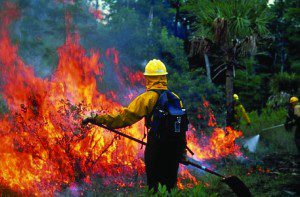
Sometimes you need to put out a fire. Sometimes you need to start one.
I am overseeing a doctor of ministry track that engages conflict and resolution. All too often, people think the key to conflict is to avoid it. While there are some conflict situations that one should avoid, like a charging bull or out-of-control car, many other conflicts require that we address them head-on. In fact, there are times when we should start the conflict.
Take forest fires, for example. Sometimes fire fighters start a controlled forest fire before a naturally occurring wildfire begins to reduce the amount of combustible material. You start it in a time of peace; it reduces the likelihood of wildfire. In a similar manner, those who are trained in conflict and resolution will start little conflicts in the absence of rage, anger, opposition and violence to reduce the likelihood of an out-of-control conflict.
There are other times when it is important to start a fire. Urban fires can put at risk entire cities. In these situations, fire fighters will sometimes burn buildings in the paths of fires to keep them from escalating (this happened in the great fires of San Francisco and Chicago early in the twentieth century).
In sum, there are occasions when fire fighters start controlled fires to keep wild ones from occurring; at other times, they keep wildfires from spreading in forested or urban settings by burning what is in the wildfires’ paths. There are still other situations when fire fighters even allow buildings to burn out while protecting exposed, but not yet burning, property from igniting. Most of the time, however, fire fighters simply put out fires (when they are in controlled environments).
As with firefighting, so too with conflict and resolution, there are various ways to address conflict: some situations call for starting conflicts, some call for containing conflicts, while others call for putting out conflicts. It takes a great deal of wisdom and discernment, which is often the result of advice and counsel received from seasoned “fire fighters” in conflict and resolution. We need their help. After all, fire fighters are always encouraged to work together, never alone.
Seasoned fire fighters and conflict fighters will tell you that one should never play with fire, nor with conflict. One never starts a conflict simply to have one; it is no game. One must know what one is doing. There must be a redemptive purpose.
One area where conflict erupts quite quickly is in inter-religious dialogue. Sometimes the conflict is redemptive. Sometimes not. Sometimes the avoidance of conflict appears to be redemptive, but it is not.
All too often, I find that those who wish to avoid conflict in the sphere of religion claim that the various religions are ultimately saying the same thing. While there are certainly points of significant contact on a case-by-case basis, there are deep and fundamental differences between various religions. We need to discuss them—even combustible ones that can generate unease and conflict, not for the sake of starting wildfires, but for the sake of reducing out-of-control conflicts from occurring. The purpose of generating such unease and conflict should always be redemptive.
Further to what was stated above, it is sometimes important to start a conflict with inter-religious or inter-faith dialogue in order to keep larger and dangerous conflicts from erupting. Religious diplomacy (as Charles Randall Paul, John W Morehead and I define it) is different from interfaith dialogue and runs into conflict with it at times for the betterment of our society. The Foundation for Religious Diplomacy focuses on addressing difficult issues in the context of building relationships and trust. It engages conflict in constructive ways so that undue conflict and even violence can be avoided. The Founder of FRD (Charles Randall Paul) tried to apply something he learned in marriage: the best marriages are those where there is the freedom to discuss differences and engage in healthy forms of conflict rather than sweep them under the combustible rug below our feet. A team related to FRD is titled “Multi-faith Matters.” At FRD and MFM, we believe that religious communities need to navigate the differences rather than avoid them.
The common refrain at certain interfaith gatherings that we are all basically saying the same thing is not accurate and does not help address the religious conflicts bound up with very different views of reality. Such statements avoid conflict, delaying and even escalating conflicts in some cases. This is one reason why I am so grateful for the late Abbot Kyogen Carlson, a Zen Buddhist priest (a fellow leader at FRD). He never minimized the fundamental metaphysical and ethical differences between our respective religious traditions, but probed them critically and charitably to cultivate understanding to reduce conflict wherever possible and build trust as neighbors and friends. Kyogen was well-trained at fighting fires. He knew when to start fires. He also knew when to put them out. For more on our work together over the years, see the following article, “Beloved Community: A Buddhist community takes interfaith dialogue beyond common ground with their evangelical Christian neighbors,” by Sallie Jiko Tisdale.
I tend to think Kyogen would have agreed with Stephen Prothero, who argues in God Is Not One: The Eight Rival Religions That Run the World—and Why Their Differences Matter that minimizing differences between religions is problematic and outright dangerous. “The Age of Enlightenment in the eighteenth century popularized the ideal of religious tolerance, and we are doubtless better for it. But the idea of religious unity is wishful thinking nonetheless, and it has not made the world a safer place. In fact, this naive theological groupthink – call it Godthink – has made the world more dangerous” (page 3). Of course, we need to look for common ground. We need to emphasize love and peace, as many in interfaith dialogues rightly do. However, we will not have healthy, strong alliances that can help guard against wildfires if we do not address in respectful ways the fundamental and at times irresolvable and irreconcilable differences that separate us. We must develop appropriate forms of tension to guard against the spread of wildfires and violence.













